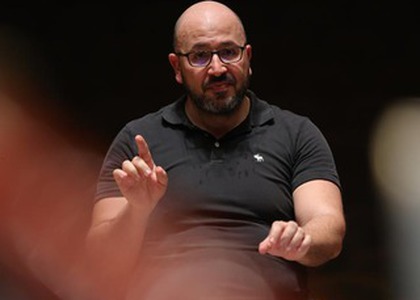> [Archived] Interviews

Interview with Lebanese conductor Toufic Maatouk
Mr. Toufic Maatouk, you return to the lectern of the Radio Chamber Orchestra. With what thoughts do you make your comeback to the conduction of the ensemble?
Every year I return to Romania, to the conductor's podium of the Radio Chamber Orchestra, and I am very happy to meet again these musicians whom I consider my friends, all the way since 2017. Each one of my returns is marked by enthusiasm because these meetings are not just about music, but about friendship and really good music. I am looking forward to the concert on March 29, when we will bring to the public a very special and different program from those presented in the previous years.
Why did you choose to join two works of Domenico Cimarosa's creation with the Requiem in C minor by Antonio Salieri?
The starting idea was for the program to be based on the concept of contrast, an idea found in the world we live in, which is entirely built on contrasts. For example, the opposition between hard times and war in some places and others where there is peace. So, the concept we started from was to create a contrast between the two parts of our concert. In the first one, we will have the one-act opera "Maestro di cappella" by Domenico Cimarosa, the main character giving the impression of a very serious man, but we further discover that his gravity can generate a lot of fun.
Furthermore, in the second part, we wanted to present some sober music. It is about people dying and resting in peace and their hope to be saved. And in the Requiem in C minor by Antonio Salieri, the words "Salva me" can be found. In this work, both the feeling of fear of the end of the world and the hope that salvation will come from God are present. Salieri's Requiem is a very special work because the composer created it for his own funeral, so I think it very well illustrates his personal fear of death, and the light touch at the end suggests that he has gone to heaven.
So I wanted to bring in this concert the contrast between the fun of the opera "Il Maestro di cappella" and the sadness of the last work, both of which are equally part of our lives. This is where the idea of the program came from.
How did the rehearsals go with the Radio Academic Choir?
I really appreciate each of the singers in the choir. Our collaboration started right from 2017. Together we brought many premieres to the stage. Because my professional background is as a singer and because of my background in vocal music and choir conducting, my relationship with the choral ensemble is a very special part of my learning and career. So, our collaboration is a pleasure because I have contact with very dedicated musicians, who want to share music with the public and the sound of the ensemble, prepared by maestro Țuțu is quite impressive. Every time I meet the members of the Radio Choir, I discover new things and I am delighted to have the opportunity to collaborate with these musicians.
What can you tell me about the collaboration with the baritone Riccardo Novaro?
This is my first collaboration with Riccardo and I am very happy about it. I've known him since Vienna, but this is the first time we're producing music together. The repertoire is a very special one, and at the rehearsals we all felt very good. "Il Maestro di cappella" is a work that spreads joy and I'm sure it will be very much appreciated by the audience.
Translated by Ioana Negrea,
University of Bucharest, Faculty of Foreign Languages and Literatures, MTTLC, year II
Corrected by Silvia Petrescu














